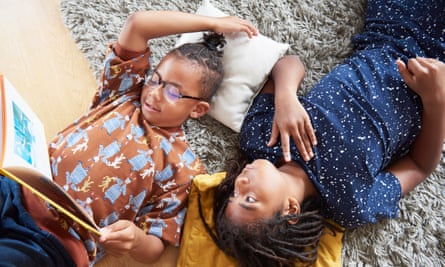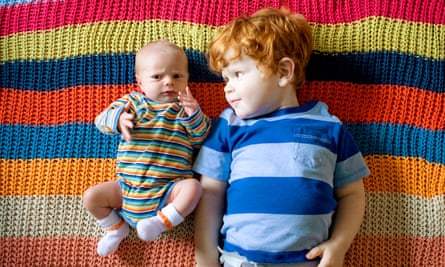The other day I was casually denigrating an only child in front of a friend who I didn’t realise was also an only child. I probably said something like, “I love her, but she’s a bit of an only child,” meaning, well, whatever nonsense I meant. I’ve got a whole bunch of siblings and step-siblings, as well as more than one kid, so I clearly wasn’t talking about my own lived experience. It opened up a conversation that we don’t normally have in front of one another – people with siblings, people without – because we’re too polite.
My friend said he understood everything: how to share, how to negotiate, how to think of others, how to look at things from another’s perspective, how to resolve conflict, how to have conflict in the first place – all the things only children were supposed not to get, he got. “But I do not get siblings. I just don’t understand why you put yourselves through it.”
Ah, the elemental question, which many of us never ask ourselves because we’ve been doing it since the day we were born: why do we put ourselves through it? “It’s the longest relationship of your life,” says Guardian agony aunt Annalisa Barbieri. “It’s really, really influential.” Even if you’re estranged, this remains true: you may not see them, but that doesn’t mean you have no relationship with them. However good this incredibly long relationship is, you’ll spend at least a portion of it driving each other crazy: the years nought to five, fighting over the same toy; the years five to 10, wanting to do exactly the opposite thing from one another, so that no one can do anything; teenage years being monstrous to each other; and on into adulthood, where we continue to fight over who’s the keeper of the memories, the arbiter of what really happened; who’s responsible for elderly parents; who’s best played the hand they were dealt; who’s the better person; and who’s got power of attorney.
Barbieri gets letters asking for advice from the parents of bickering children, but “far, far more from adult siblings who still can’t get on”, she says. “I think if more people worried about it as parents, there would be fewer people worrying about their siblings in adulthood. They say: ‘They fuck you up, your mum and dad,’ but actually your siblings can really fuck you up.”
So what goes wrong?
First, there is the dethronement of the eldest. It’s painful enough, going from being the golden child around whom everyone’s world revolves to suddenly being the less urgent noise in a cacophony of chaos. But parents make it worse by poorly managing the older child’s expectations. The new baby is not going to be fun. It’s going to be trouble, for ages. We try all these useless tactics, like arriving home with a new baby and a Thomas the Tank Engine, which we pretend is from the new baby – when what we should do, says Anita Cleare, author of The Working Parents’ Survival Guide, with a background in developmental psychology and social work, is “stand in that child’s shoes. There’s no way of selling a baby to them as a positive. Babies monopolise the parents, they cry, you can’t play with them.” Instead of flat-out lying, she says, “we just have to be kind and consistent. Try to keep their life as normal, as the same, as it was before. So they don’t feel like they’ve lost everything.”
And now there are two, or more, and it is existentially important that you treat them both the same. Except that isn’t possible, because you are a person, and your partner (if you have one) is a person, and each child is a different person, and you’re at a different point in your life, and a different point in your life cycle as a parent. I think of the acres of time I just laid at my son’s tiny feet, no plans, no bustling, arrangements cancelled on a dime because the thought of waking him up or even rearranging any of my limbs was intolerable. If I’d acted like that after my daughter was born a couple of years later, my son would have had a thing or two to say.
This is the blessing and the curse of the firstborn, what psychotherapist Nicole Addis calls the “heir apparent fallacy”. She says: “There’s often a huge narrative behind the first child that the parents develop consciously and unconsciously, the hopes and aspirations within the relationship and outside it. There’s a lot that goes into that first child that the poor child ends up carrying. And I don’t think we ever do that quite the same way with the children that come after.”
This can look like favouritism to the second (or later) child, or maybe it looks like favouritism from one parent and anti-favouritism from the other. But however it looks, if the children experience it as differential treatment, they will take that out on each other. “Sibling rivalry is about perceived or real injustice,” Barbieri says. “That’s the conclusion I’ve come to after 15 years of writing an advice column. It all comes down to that. Children are quite powerless: they’re not going to take their feelings out on the parents – they’re going to take them out on the weakest member. I don’t think parents are taught how much power they have, and how much is their responsibility.”
Addis describes some other factors that might lead parents to favour one child: “reproductive narcissism, the child that is in some ways the vision of our own unfulfilled hopes and wishes and dreams. We might get into a narcissistic bubble, where we bask in the glory of each other. Or it could be just on a very basic level: you enjoy the same things as each other, so there’s an easy connection, as opposed to the child that if you say ‘white’ is likely to say ‘black’.”
Or maybe you’ll make that mini-you the repository of your own doubt and self-hatred, and that won’t feel like favouritism at all. Either way, all you have to do is supply an imbalance, and your kids will fill in the blanks with fighting. Endless, endless fighting.

The narcissism issue may become more pronounced or problematic if there is conflict in the parents’ relationship, as the adults mediate criticism of one another through the more-similar child. “One parent may try to harness one child; the other parent will try to get hold of the other,” Addis says. “This is terribly upsetting for the children, but it also creates a projection of the parents’ conflict.” It won’t necessarily help if you split up, as separated parents are more than capable of expressing their disappointment and loss through the child that they perceive as most similar to their ex. It’s seriously a nightmare, having a family, when you really think about it.
Sure, self-examine if your children are bickering, but don’t wallow: they weren’t born knowing how to get on, and they could easily be very different people. Now you need to know what to do. Be patient, Cleare says: “Under the age of four, children haven’t got that ability to see things from another perspective. We can help them learn to do kind behaviour and take turns, but collaboration, negotiation, thinking about somebody else – those things take time.”
At any age, she says: “The biggest trap parents fall into is directing too much attention to when children get it wrong rather than when they get it right. We fall into the habit of giving them attention when things are getting out of hand, and they tend to repeat the behaviour that gets them attention.” Children often say “It’s not fair” when what they actually mean is “I didn’t get the best out of that situation”, but then sometimes it isn’t fair, and sometimes you’re tired and you can’t remember how it started or what you promised or how it could be humanly possible to go to a swimming pool and not go to a swimming pool at the same time.
“Don’t get into the ‘it’s not fair’ game,” Cleare says. “You don’t adjudicate with competing demands: you teach them problem-solving skills. If they’re fighting over a toy that they both want, ask them what’s the problem. OK, so you both want to play with the same toy. Who’s got an idea what you could do about that? They might be a bit reluctant at first, but the idea is to teach them how to problem-solve collaboratively. If they can’t agree, you take that toy away for five minutes, and say: ‘We’ll try again in a bit.’”

Whoosh, now they’re teenagers (it really does go fast) and they don’t want a toy – they want to be unbelievably vicious to one another. I remember how once my sister, in an argument about who would wear which school dress, ripped one down the seam and walked off in the other, so I couldn’t go to school at all. I mean, seriously.
There is evidence that same-sex siblings fare worse in adolescence. There’s also evidence that the closer teens are in age, the more they’ll fight. But Addis takes that with a pinch of salt: “I used to work in a fertility clinic, and expectant parents would always be asking: ‘When should I plan for the next one?’ There’s arguments for and against almost any age and stage. The second is always a threat to the first; the third is a threat to the second.” There tends to be less overt conflict with an age gap of more than two and a half years, which is when children start to separate from the parents, develop a theory of mind and an independent social world. But siblings with a smaller gap can be thick as thieves in adolescence, because there is more overlap in their friendship circles and development. For the record, my sister is two years older than me.
Why are some teenage siblings so horrible to each other? “Teenagers are inherently alert to social threat,” Cleare says. “The developmental stage they’re going through is that they’re hypersensitive to any social threat, exclusion, not being liked. That can come into play with two teens together.” Alternatively, it could be about identity: “You’re striving for significance as a teenager,” she continues, “staking your claim to likes and dislikes and personhood. And sometimes you do that by being different from another person, and a sibling is a natural choice. ‘I’m not like them – they must be rubbish.’” Again, what you don’t want to do as a parent is get into the fray, because that just means three (or more) people fighting. “This is about modelling. We speak kindly to each other as adults; we speak kindly to our children.”
Once you are into adulthood, whatever your parents did or didn’t do to make you feel equal, or empowered, or secure, or confident negotiating conflict, you have to sort things out for yourself. Or you don’t, necessarily. It’s not shameful for this relationship to fracture – it’s just not easy, either. I was always fascinated by the rivalry (hatred) between the sister novelists AS Byatt and Margaret Drabble: Byatt, who died last week, was considered the more literary, Drabble the more readable. They were pretty open about their rift, to the point of constructing whole novels about having an awful sister. Byatt lost her son when he was 11, and they still didn’t make up, not even close. I remember reading about that estrangement and thinking, whatever it is, nobody has walked into the sunset, whistling.

A huge amount of tension comes from the necessity of tolerating one another’s different perspectives: it is incredibly difficult for siblings to accept that there isn’t a single truth they all sign up to. “Every sibling you speak to will have a different version of their upbringing,” Barbieri says, “and they all need to be tolerated. The older sibling will think they’re the holder of the truth, and they can tell the younger ones how it was. That can be really difficult, especially if one child was treated worse than the other.” This is part of the uniqueness of siblings, too: that there isn’t any other relationship you’ll ever have, however deep the love or friendship, where their diverting from your version of the past puts your credibility, your essence, at risk. You can’t give it up: which of us would be prepared to say: “Well, that’s the furnace in which I think I was forged – but who knows, I might be wrong?” But you do also kind of have to give it up.
Addis also talks about what you could call the Succession conundrum: “families where siblings are quite symbiotic, where there’s a little bit too much investment in each other’s lives. That can be because there’s an insecure attachment to the parents, which is subtle or hasn’t been aired, and the siblings will cling together a bit too much. But when a sibling relationship is working and working well, it’s not symbiotic – it’s adult-to-adult. You’ve got a friend for life, you’ve got a support for life, you’ve got somebody who knows you inside out.”
“Like all human relationships,” Barbieri says, “it’s not about the rupture, it’s about the repair.”
I have one full sister, two half-sisters, one half-brother, a stepbrother and another half-brother whose favourite film, from the moment it came out when he was 19, has been Punch-Drunk Love, about a man sent crazy by multiple domineering sisters. Apart from my stepbrother, who is a honey, they are all impossible, and the only thing more impossible than them would be not-them.
Credit: Source link




